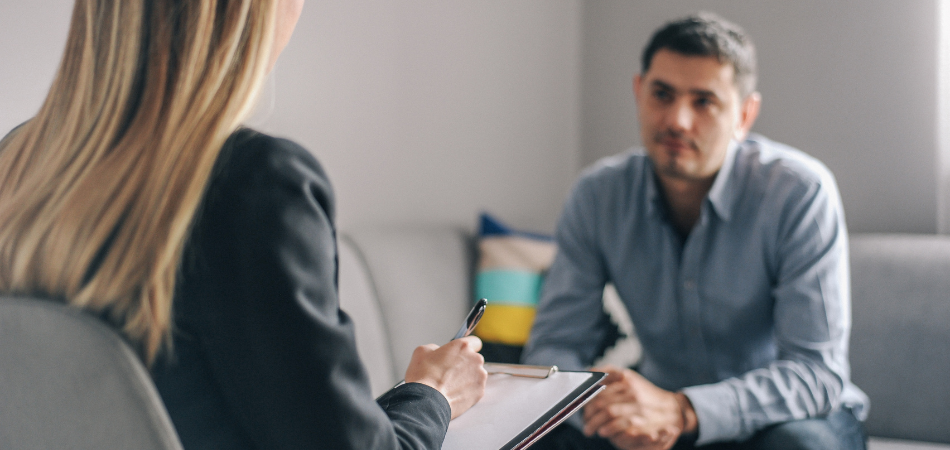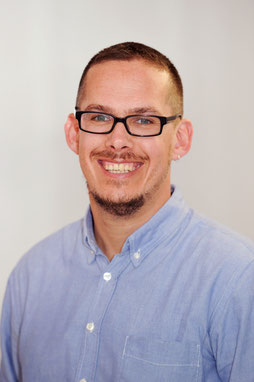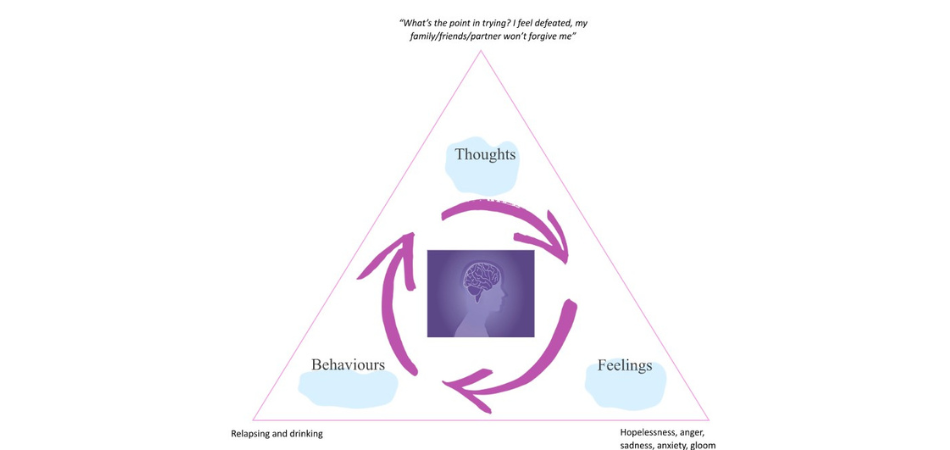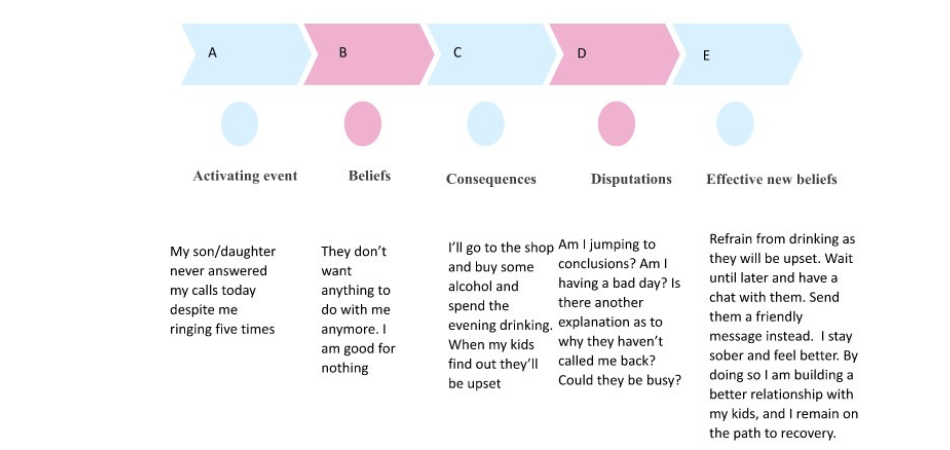Cognitive Behavioural Therapy (CBT)
Cognitive Behavioural Therapy, shortened to CBT, is an effective form of psychotherapy used at Sanctuary Lodge to treat addiction. CBT is built upon the theory that destructive thoughts lead to unhealthy behaviours, which, in turn, promote substance addiction, behavioural addiction and co-occurring disorders. CBT is beneficial because it operates on the theory that questionable thoughts, behaviours and feelings are learned and, more importantly, can be replaced by better, more positive and helpful ones. This is why CBT for addiction is highly effective in enabling and maintaining recovery.

What is CBT for addiction?
CBT works by pinpointing irrational or unhealthy thought patterns that give way to addictive tendencies, and instead offer clients alternative perspectives so that they can respond in healthier ways.
The connection between thoughts, feelings and behaviour can be visualised as a triangle (like the one below) with one element at each of the triangle’s three points. All three aspects work together to form behaviour. As you can see, a person’s unhelpful (and often catastrophising) thoughts produce negative feelings, and such feelings drive them towards addictive behaviour. The first goal of CBT is to expose this pattern to the client, so they can see how their thoughts, feelings and behaviour all work in unison to fuel addiction.
What does CBT for addiction entail?
In CBT, you work alongside your therapist to identify difficult emotions, recognise harmful behaviours and rationalise irrational thoughts. You will develop skills and will be able to utilise them after rehab and throughout your life. Once you complete your CBT therapy programme, you will be more likely to:
- Identify triggers for addiction
- Avoid high-risk situations (where temptations may arise)
- Recognise your emotions
- Control your reactions to your emotions and challenging situations
- Understand and manage cravings
Four forms of CBT have been recognised as particularly effective for treating addiction: The ABCDE model, motivational interviewing, contingency management, and relapse prevention. Let’s look at them in closer detail.
What are the five steps of CBT?
The five steps of CBT, otherwise known as the ABCDE model, are developed by psychologist Robert Ellis. The ABCDE model is a therapeutic tool used in CBT to understand, confront and change maladaptive patterns.
The ABCDE acronym defines the steps of the approach:
- Activating Event: Identifying the event activating the harmful belief
- Beliefs: Recognising the feelings triggered by the activating event
- Consequences: Realising the emotional and behavioural consequences of the beliefs
- Disputation of beliefs: Learning to dispute the destructive idea
- Effective new beliefs: Developing new, effective responses and thinking patterns
The essential element of this method is the ‘D – disputation’ step. You can consider this step as your shield from irrational and destructive thoughts. This phase allows you to pause and to question the validity of a negative thought so you can redirect it to a more positive place. Using the example in the triangle above, let’s look at an example of how CBT for alcohol addiction might work below:
As you can see, a person’s actions depend on their feelings, created in response to their thoughts. Therefore, if we change the perspective of our thoughts, new behaviour can unfold. For example, if the client in the above example chose to respond to their beliefs (B) they may have relapsed, which is likely to spur more destructive thoughts and feelings. This is just one of many examples of how CBT therapy for alcohol addiction works.
Other branches of CBT for addiction
Motivational interviewing (MI) is a therapeutic approach to addressing anyone who may be hesitant toward treatment. The goal of MI is to bring to the surface the thoughts and feelings driving your reluctance so that you can get help and resolve this issue.
Relapse prevention (RP) aims to help you identify and avoid stressful situations where you may end up in danger or encounter problematic stress levels. This method is often used as one of the CBT techniques for drug addiction. You can consider this a rehearsal for real-life occasions where you may experience triggers and temptations. You and your therapist will construct pretend scenarios to help you to manage your emotions better whilst working to develop alternative, adaptive reactions which will help you to avoid relapse and sustain recovery.
We pride ourselves on our array of addiction therapies including CBT, which has proven time and time again to be immensely effective for helping clients recover from addiction. If you want to know more about CBT for addiction, give us a call today. One of our experienced advisors will discuss our rehab programme and CBT in more detail.
Frequently asked questions
Disclaimer:
The availability of therapies may vary across UKAT centres. The specific therapies provided will be determined based on your treatment plan and the programme offered at your chosen facility. All treatments are subject to clinical assessment and programme availability at the time of admission. For further details on the therapies included in your treatment plan, please contact our admissions team.






